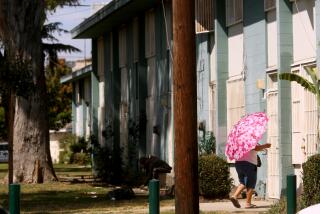Imperial S&L; Ordered to Halt All New Loans
- Share via
SAN DIEGO — The parent of Imperial Savings, one of California’s largest thrifts, was ordered Friday to halt all new lending and investment activity while regulators decide if the ailing institution can meet tough new federal standards for savings and loans.
The restrictions on Imperial Corp. of America in San Diego, long troubled as a result of its foray into high-yield junk bonds and other non-traditional investments, comes as regulators are moving to deal with about 800 thrift institutions nationwide that fail to meet new standards designed to shore up the ailing industry.
Imperial fails to meet new standards for capital, which is the financial cushion savings and loan associations must maintain to protect against losses. The tougher standards were enacted last year in the wake of the nation’s S&L; debacle, which may end up costing taxpayers more than $200 billion, and are designed to force institutions to put more of their own money at risk.
Regulators confirmed that the restrictions slapped on Imperial go beyond normal restrictions they placed on other thrifts failing to meet the standards, which took effect Dec. 7.
Imperial, which has 80 branches statewide, cannot even fund a new home loan until regulators decide if a plan to restore its capital that has been submitted to regulators is acceptable.
Imperial can still take deposits, however. Deposits remain insured by the federal government up to $100,000 and its branches remain open under normal hours.
An Imperial spokesman, Bruce Dunn, confirmed that the thrift has no tangible capital, which is the most basic measurement and is defined as a thrift’s real assets minus its liabilities. At least $1.50 of every $100 in assets at a savings and loan must be tangible capital.
Dunn said, however, that Imperial is not an isolated case. “It appears many undercapitalized thrifts have received these letters,” Dunn said.
But industry officials said the only other thrift they know of in California under restrictions as severe is Financial Corp. of Santa Barbara, parent of Santa Barbara Savings. The institution announced a week ago that it could not make new loans.
Executives at other major thrifts failing to meet standards said they have not been placed under such limitations. In general, thrifts not meeting the standards will be restricted from growing in size and paying dividends until their plans, to be submitted by Monday, are approved.
Office of Thrift Supervision spokesman William Fulwider in Washington declined to say whether the restrictions on Imperial were a prelude to a takeover. He also declined to give a total of thrifts that received similar letters.
Bert Ely, a thrift consultant in Alexandria, Va., said he is puzzled about why regulators would put the restrictions on Imperial if things are so bad, instead of simply seizing it.
“I don’t understand why they don’t just go ahead and pop it into conservatorship and be done with it,” Ely said.
Imperial has been in hot water with regulators for several months, and its problems have grown in recent weeks. Imperial disclosed last month that it has a negative net worth after sustaining more than $200 million in losses on its junk bond portfolio last year. Those losses, combined with $47.4 million in loss provisions taken to cover bad car and mobile home loans, caused ICA to lose $136.2 million for the first nine months of 1989.
Junk bonds are high-risk, high-yield bonds issued by corporations with low credit ratings. They pay higher interest rates than other bonds to compensate for the higher risk of default.
Another major thrift that invested in junk bonds, Columbia Savings & Loan in Beverly Hills, had restrictions imposed on it last November. Columbia’s $3.8-billion portfolio of junk bonds has tumbled in value as a result of investor nervousness caused by financial problems experienced by some companies that issued junk bonds, and by general fears of a recession.
Columbia’s restrictions, however, are not as severe as Imperial’s and a spokeswoman said that it has not been notified of any additional restrictions. Executives with other large Southern California thrifts that fail to meet the standards--Mercury Savings, FarWest Savings, Valley Federal Savings and Great American Savings--said Friday that they are not under similar restrictions to Imperial and can continue making home loans.
Imperial’s Dunn said the thrift’s officials will meet with regulators next week to obtain more details on what sorts of business it can still conduct.
Fulwider said the Office of Thrift Supervision has provided its parent, the Resolution Trust Corp., with a list of about 200 to 300 troubled thrifts that it has “targeted for conservatorship” or takeovers. Fulwider would not say whether Imperial is on that list and added that it was improper to infer that any S&L; placed under the restrictions such as those imposed on ICA would inevitably be shut down.
Like all other S&Ls;, ICA is being forced to liquidate its junk bonds to conform to the S&L; rescue bill requirements. ICA has already reduced its junk bond holdings from $1.4 billion to $850 million over the last year. The bonds remaining must be marked to market value, a requirement that, amid a collapsing junk bond market, has led to steep losses for S&Ls; such as Imperial and Columbia.
ICA Chief Executive Kenneth Thygerson, who engineered its entry into “non-traditional” activities including junk bond investments and car and mobile home loans, resigned last July. The S&L; recently agreed to a $13-million settlement of a shareholder lawsuit that alleged that ICA withheld potentially damaging information from shareholders.
To mollify regulators, the S&L; announced last summer that it would drastically reduce its assets to raise its capital ratio. Indeed, Imperial’s assets have shrunk to a current level of “between $9.8 billion to $10 billion” from $12.3 billion at the end of 1988.
ICA has also sold nine business operations in the last year, including its credit card operation to Wells Fargo on Dec. 29 for a $60-million pretax gain. The gain was more than wiped out by junk bond losses, however. Administrative expenses have been cut by 15%, and ICA has cut its payroll from 2,100 to 1,900 this year, Dunn said. ICA plans to trim additional expenses soon but would not specify how.
Kraul reported from San Diego and Bates from Los Angeles.
More to Read
Inside the business of entertainment
The Wide Shot brings you news, analysis and insights on everything from streaming wars to production — and what it all means for the future.
You may occasionally receive promotional content from the Los Angeles Times.










